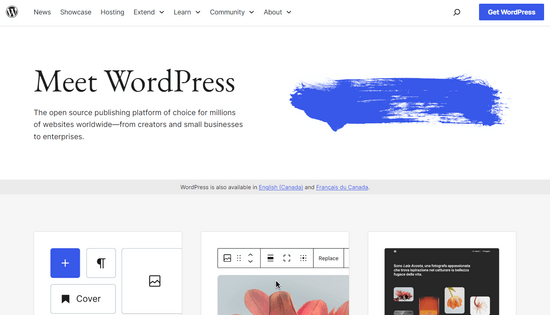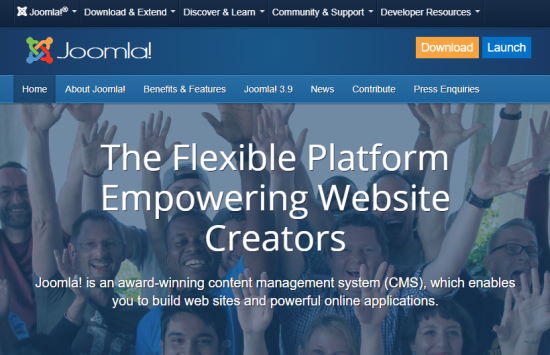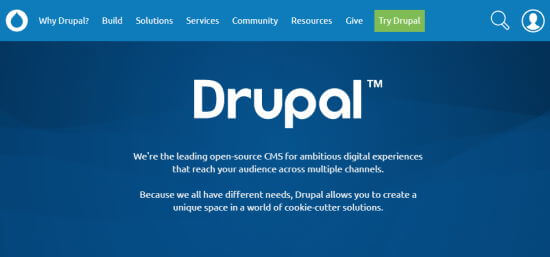What is a CMS Platform?
A CMS platform (content management system platform) is a piece of software that allows you to easily manage content and create a website.
Normally, web pages are written in HTML, JavaScript, and CSS programming languages. If you were to build a website without a CMS platform, then you would need to learn these languages and write a lot of code.
CMS platforms solve this problem by allowing you to make a website without writing code or learning programming.
Unless of course, you’re looking for a developer-friendly CMS which means you already know how to code.
How to Choose the Best CMS Platform for Your Website
There are lots of different CMS platforms out there, so which one should you pick? Before you we jump to our CMS platform comparison, here is what you should look for in a good CMS.
Ease of use
You want a CMS that makes it easy for you to create and edit content. This often means having a drag and drop interface, so you can add different elements on your pages.
It should be quick and straightforward for you to make changes to the content on your site after publishing it.
Design options
Your CMS software should offer you plenty of website design templates to choose from. It should also allow you to easily customize those web designs to your own requirements (ideally without any technical knowledge or writing code).
Data portability
A great CMS platform should have tools for you to easily export your data and move it elsewhere.
For instance, you may later decide to choose a different platform or a different hosting company. Data portability makes it easier for you to move around with complete freedom.
Extensions and addons
Not all websites are the same. This is why it is impossible for any CMS platform to come with all the features that would fulfill requirements for every website.
Extensions and addons fix that problem. These are separate software that you can just install on your CMS software to extend its features and add new ones when needed. Think of them as apps for your CMS platform.
Help and support options
Although CMS platforms aim to make building a website as straightforward as possible, you still might have some questions. Find out what help and support is available if you get stuck.
Some CMS providers will have a handful of FAQs and a customer service team that’s painfully slow to respond. Others will have a big supportive community that can help you any time of the day or night.
How much does it cost?
Some CMS platforms are completely free. Others charge a monthly fee. Even with free CMS platforms, you’ll often need to pay for third-party extensions, designs, and/or web hosting services.
Try to find out as much as you can about the pricing before you choose your CMS, so you don’t have any nasty surprises.
With these things in mind, let’s take a look at the best CMS platforms to choose from.
1. WordPress.org

WordPress.org is our number one choice for the best CMS platform. It’s the world’s most popular CMS software, and it powers around 43% of all websites on the internet.
It’s important to not confuse WordPress.org with WordPress.com. WordPress.org is a free open source CMS originally designed for blogging, but now it’s used by all sorts of websites / online stores. WordPress.com is a blog hosting platform.
If you’re not sure about the difference between the two, check out our detailed comparison of WordPress.org and WordPress.com.
Note: When we talk about WordPress on WPBeginner, we normally mean WordPress.org. We specify WordPress.com where appropriate.
You need to host your WordPress site yourself, which means finding a suitable WordPress hosting provider.
Pros
- WordPress offers you the flexibility and freedom to build any kind of website (online store, auction site, membership site, etc).
- It does not require any technical skills or coding knowledge. The WordPress block editor makes it really easy to create great looking pages on your site.
- You have complete freedom to make money online from your website in any way you want.
- There are thousands of WordPress themes and plugins available, both paid and free. These let you add all sorts of useful extras to your site, like contact forms, photo galleries, social media share buttons, and much more.
- WordPress is really well designed for search engine optimization (SEO). It’s easy to create SEO-friendly URLs, categories, and tags for your posts. You can also choose from plenty of SEO plugins to help you do more.
- There’s a huge and supportive community around WordPress, as it’s an open source CMS.
- WordPress offers a lot of extensibility which is what makes it an ideal CMS platform for both beginners and developers alike.
- WordPress lets you download all your content in XML format, making it easy to move to a different system in the future if you choose to do so.
Cons
- You’ll need to set up your hosting and domain name, and you’ll be responsible for managing things like security and backups.
- Because WordPress offers so many options and so much flexibility, it can sometimes feel a little daunting when you’re getting started.
Pricing
WordPress itself doesn’t cost anything. However you’ll need a domain name (around $9 – $15 per year) and a hosting account with a web host that can run WordPress (normally from $7.99/month).
If you need some help getting your WordPress site started, check out our guide on how to make a website with step by step instructions.
2. Joomla

Joomla is another popular free open source CMS platform that comes with lots of different templates and extensions. It’s free to use, but you’ll need hosting and a domain name. According to our CMS market share report, Joomla powers 1.72% of all websites.
It was first released in 2005, so like WordPress, it’s been going for years. Joomla is packed with features, and many web hosts offer a 1 click installation. However, it’s really an ideal CMS platform for developers and experienced website creators, so it’s not such a good option for beginners.
Pros
- Joomla gives you lots of flexibility and plenty of options. It’s a good choice if you’re building something complicated or bespoke.
- Although Joomla is particularly useful for developers, you can still use it even if you don’t want to ever touch a line of code. It’s easy to edit your content.
- Like WordPress, Joomla is open source, and there’s lots of community support available if you get stuck.
- You can use Joomla to run an eCommerce store as there are extensions available for this.
Cons
- Even Joomla fans will admit it can be pretty complex. Depending on what you want to do with it, you may well need to hire a developer to help out.
- There aren’t that many options for additional extensions. If you’re used to a CMS like WordPress, which has thousands of available themes and plugins that extend the core functionality, you might be disappointed by Joomla.
- There can be some compatibility issues if you have a lot of different extensions and modules installed.
Pricing
Joomla itself is free, though you’ll need to pay for a domain name and web hosting that supports Joomla. SiteGround is a good option here, as they have specific Joomla hosting plans with lots of handy features.
You may find yourself paying for some extensions to add more functionality to your website. You might even want to budget for getting help from a developer, depending on what you’re trying to achieve.
3. Drupal

Drupal is another open source CMS solution. It’s the CMS behind some major websites, including The Economist’s site and a number of university’s sites.
Drupal is a good option for developers, or for people able to hire a developer. It’s especially good if you’re aiming to build a highly customized site that needs to handle a lot of data.
You can host a Drupal site on SiteGround. They offer free installation and can even help you transfer an existing Drupal site.
Pros:
- It’s easy to add content on Drupal. The custom content types are flexible and offer plenty of options for content creation.
- There are lots of different modules available that you can add to your site (these work like WordPress plugins).
- Support is available via community support options similar to other popular platforms like Joomla and WordPress.
- User management is easy, with a built-in system where you can create new roles and specify their permissions.
Cons:
- With Drupal, it can be tricky to figure out how to change the appearance of your site or add extras. It’s definitely not as beginner-friendly as WordPress.
- Most Drupal websites have a heavily customized theme created by a developer, which can be very expensive.
4. Wix

Wix is a popular cloud-based CMS platform, though it has some limitations. We often get readers asking how to switch from Wix to WordPress that’s because every smart business owner knows that WordPress is definitely better than Wix.
With that said, Wix is beginner-friendly and it might be worth considering. It offers a free plan, too.
Pros
- Wix’s drag and drop interface makes it really easy to create pages that look just how you want. You can select any part of your page and start editing it.
- There are lots of pre-made templates you can choose from in Wix. These are fully responsive, so they look great on mobiles and computers.
- You can add lots of apps to your site from the Wix App Market. These work like WordPress’s plugins to give your site new features.
Cons
- Once you’ve chosen a template on Wix, you can’t change to a different one. This could mean that you get stuck with a layout that’s not quite right for your site.
- You can’t run an eCommerce store on Wix unless you upgrade to a paid plan, and even then, you can only accept payments using PayPal or Authorize.net.
- Wix doesn’t allow you to easily download your data and export it. You can download your blog posts (though not your images) to move them, but if you have any pages on your site, you’ll need to copy and paste these manually. We have full instructions on how to move your Wix site to WordPress.
- If you’re using the free plan, you’ll have a Wix-branded domain name and ads on your site. The ads make money for Wix, not you.
Pricing
You can use Wix for free, if you’re happy with a Wix-branded domain name and ads running on your site. The paid plans offer more flexibility and start from $13 per month (paid upfront annually).
If you want to take online payments, you’ll need to pay $23/month or more (again, upfront annually).
5. Shopify

Shopify is another all-in-one hosted CMS platform. You won’t need to buy hosting, install any software, or manage things like updates and backups.
It has an intuitive drag and drop interface. It supports in-store sales, which is great if you have a physical store as well as an online one.
Pros
- You can accept credit and debit cards through Shopify’s integrated payment solution, Shopify Payments. PayPal is also included as one of Shopify’s default payment providers.
- There are lots of extensions and themes available for Shopify. You can buy third-party Shopify apps that let you add all sorts of features to your online store.
- You don’t need to upgrade if you make over a certain dollar amount in sales, like you do with BigCommerce.
- Shopify has 24/7 support through live chat, email, phone, and even Twitter. There’s also lots of documentation available (including written how-to guides and video tutorials) plus online forums.
Cons
- Your costs can end up quite high, especially if you want to add lots of third-party apps to your store.
- You may find that you want to add functionality that simply isn’t available: Shopify’s apps are more limited than things like WordPress’s plugins.
Pricing
Shopify’s pricing plans are similar to BigCommerce’s options. There’s one major difference, though. Shopify doesn’t make you move up to the next plan based on a certain dollar figure in sales.
The cheapest plan is $39/month. The most expensive is $399/month and includes more features. You get a discount for paying for a year upfront.
Disclaimer: There are many other popular CMS solutions on the market like Squarespace, Contentful, Webflow, and others. However, we decided not to include them in this list to avoid causing choice paralysis.
Which is the Best CMS Platform?
We believe that WordPress.org is the best CMS platform and website builder in the world. Over 43% of all websites on the internet is powered by WordPress, and there’s a good reason for that.
WordPress has everything you want in a perfect CMS platform. It’s easy to get started, and many WordPress web hosting companies offer a 1 click install process. You can extend the functionality in almost any way you can think of using plugins (which are like apps for WordPress).
On WordPress, you could run an eCommerce store, an online forum, a LMS (learning management system), a membership site, an auction site, a marketplace, and almost anything else you can think of.
There are no limits on what you can do with WordPress, and if you find that you need more space for your site as it grows, you can easily upgrade your hosting to managed WordPress hosting company.
Frequently Asked Questions About CMS (FAQs)
In case there’s still more you want to know about CMSs, we’ve put together this list of frequently asked questions.
Which CMS platform is best for eCommerce?
The best eCommerce CMS platform is WordPress with WooCommerce. While other eCommerce platforms are good too, we think WooCommerce is the best one out there for most online store owners.
Which CMS platform is best to build a small business website?
WordPress makes it super easy to build a small business websites. It has a very wide range of themes (designs) to choose from and enables you to use all the tools you’ll need to grow your business.
Can I use a CMS platform without a domain name or hosting?
All websites need hosting. Sometimes this is provided by the company who has created the platform (like with Blogger) and sometimes it’s something you buy from an independent web host (like when using WordPress).
If you choose a free platform like Blogger or WordPress.com, you can use their free subdomain to start your blog, such as yourname.blogspot.com. This doesn’t look very professional, though, so you’ll almost certainly want to register a domain name at some point.
Do I need a CMS to start a blog?
Yes, a blogging platform is a type of CMS that allows you to easily publish content. There are lots of different blogging platforms available. Our article on best blogging platforms compares a number of both free and paid options.
Which is the best CMS software for advanced users?
Because WordPress is an open-source software, it is often the platform of choice for advanced users and web developers.
While WordPress is very user-friendly for beginners, it also has a robust API that developers can use for advanced customization.
WordPress is written in PHP backend, but the front-end is customizable, so you can use it with headless JavaScript platforms.
It can be optimized to offer enterprise-level scalability, multilingual functionality, and basically anything else that you need to build any type of website.
We hope this article helped you learn more about the best CMS platforms. You may also want to take a look at our step by step guide to creating a WordPress website for help on getting started with WordPress, or see our expert picks of the best business phone services.

